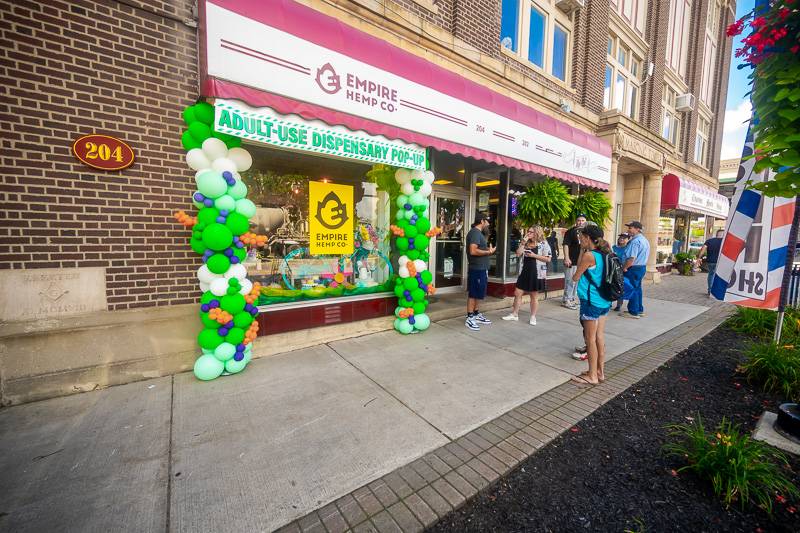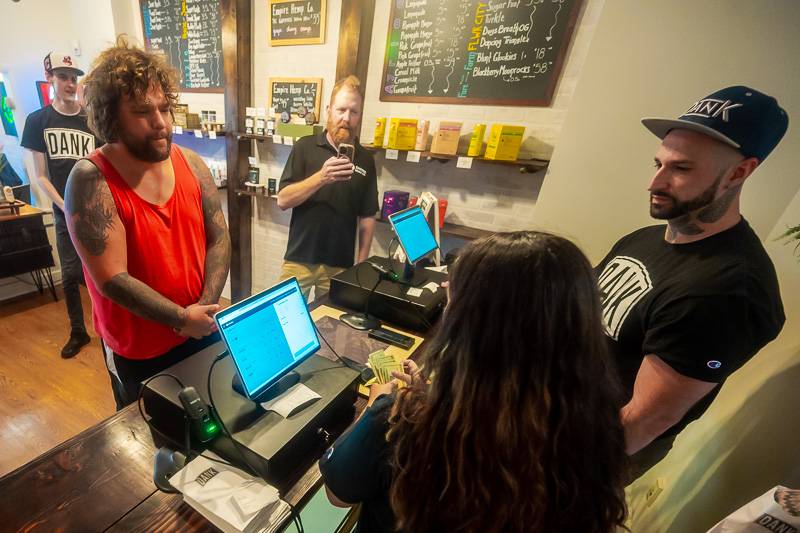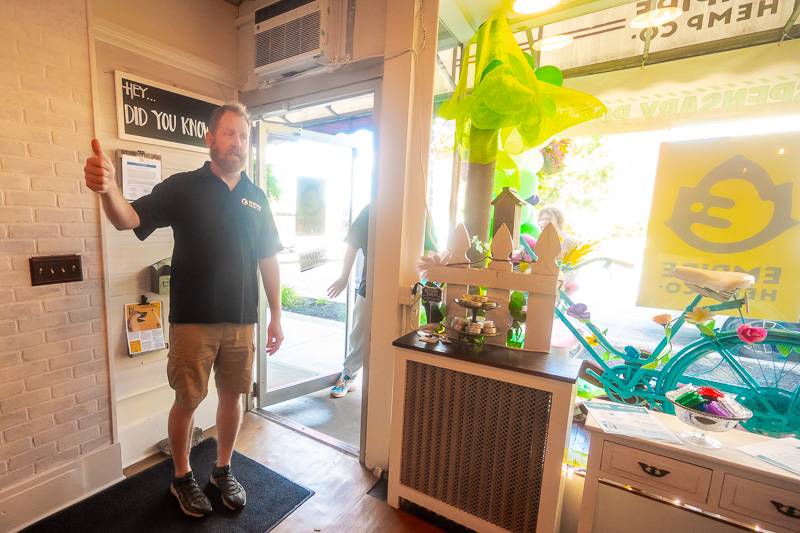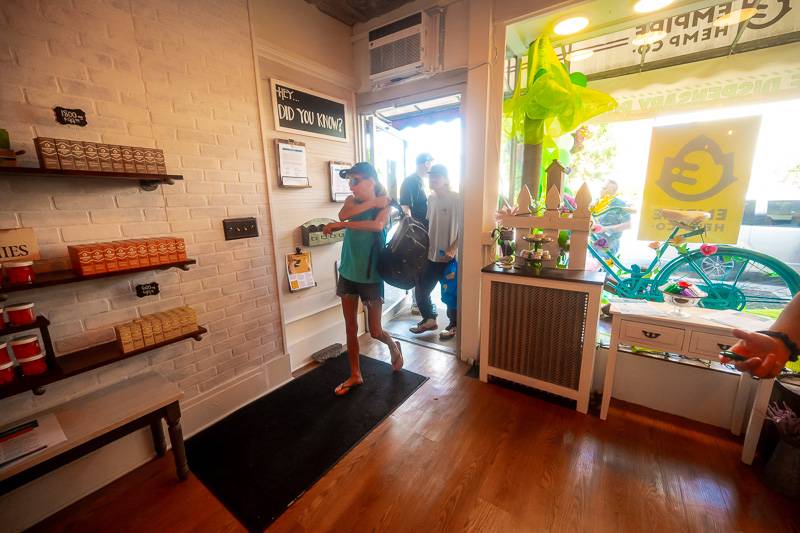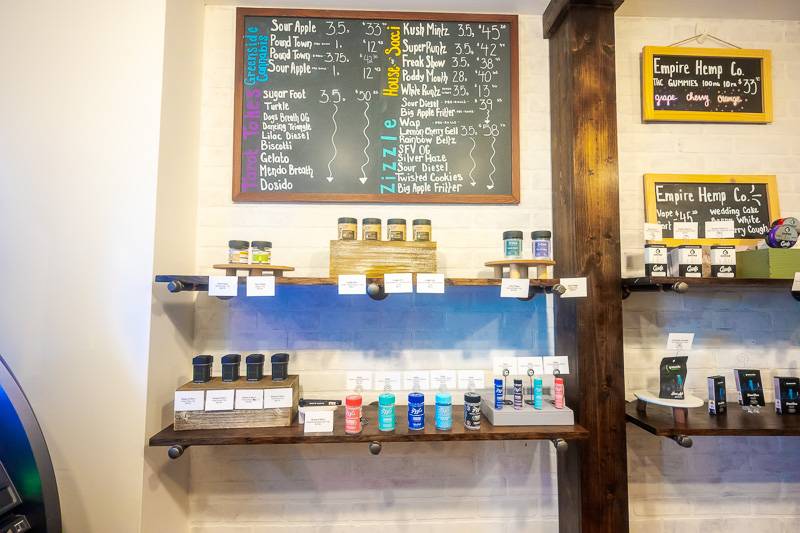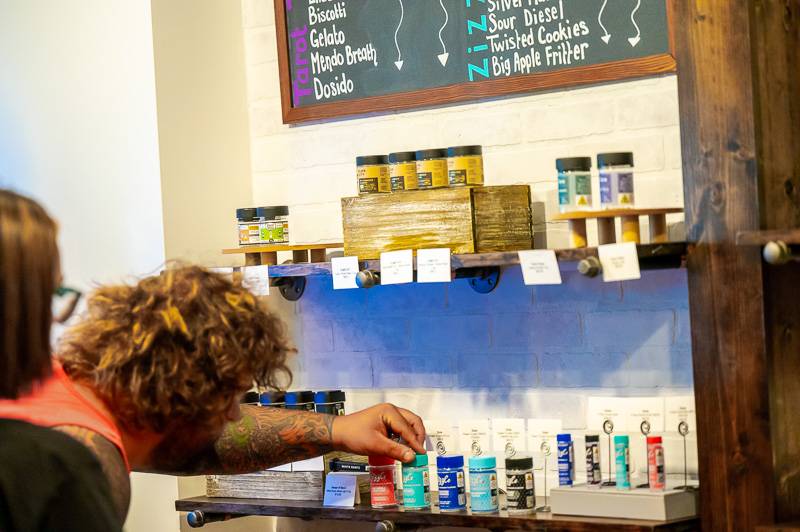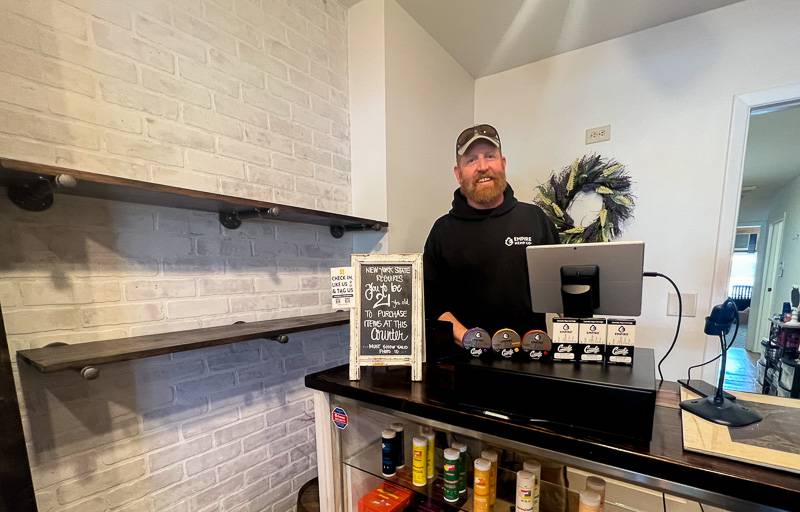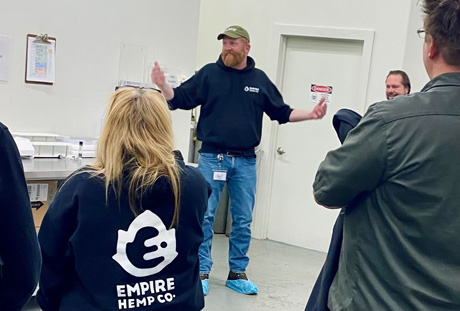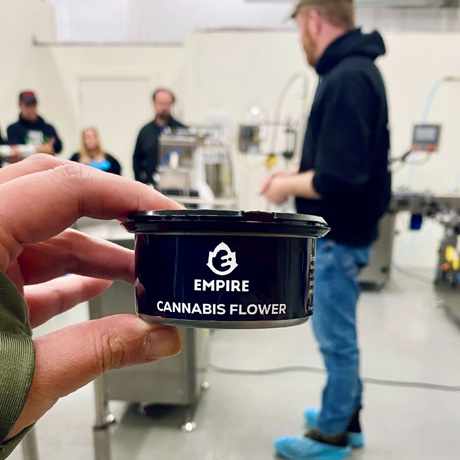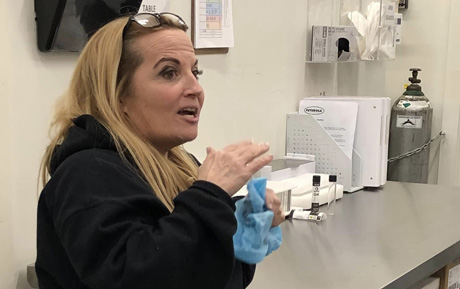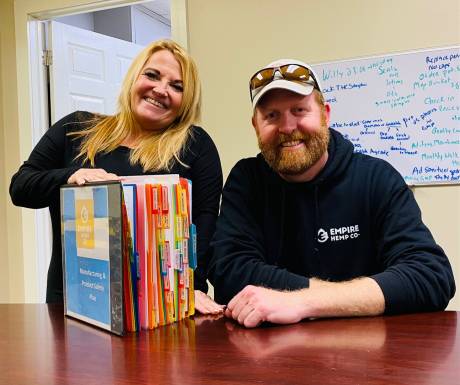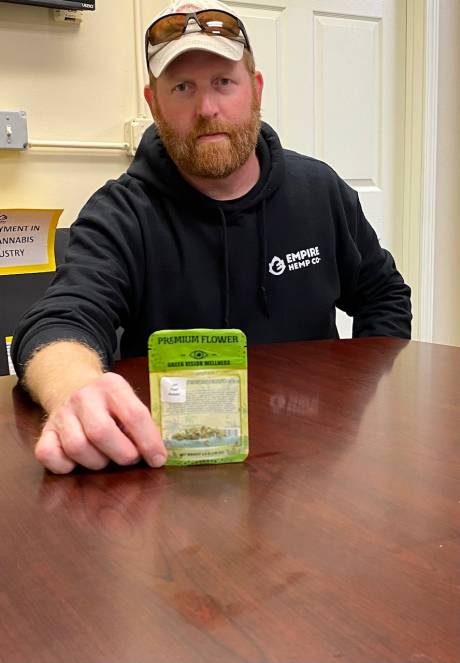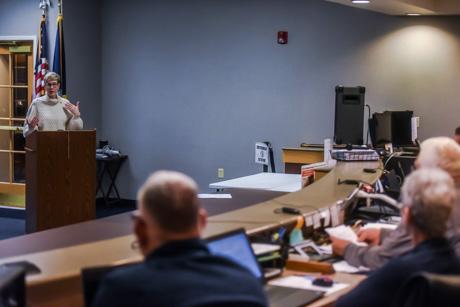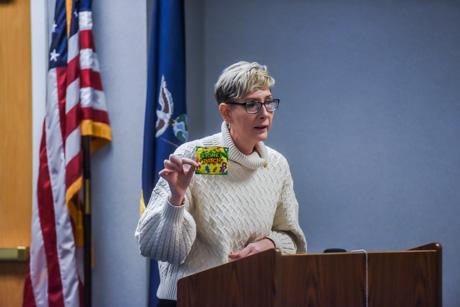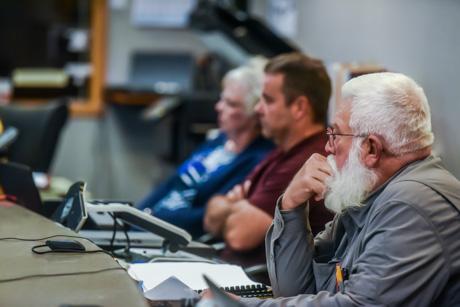He kind of hates to admit it, but the doom of COVID for most businesses was actually a boon for Empire Hemp Company, Chris Van Dusen says.
“Back then we had hired some employees, and we had COVID hit. So we did a walk-up window for COVID. And it was taking off. So we decided, to survive here we were going to open a store,” said Van Dusen, company founder and CEO. “So we had to let the guys go. And that's how we opened the store. So the store really took off … it was just the two of us doing everything.”
His other half, wife Shelly Wolanske, has been as fully immersed in the business as he has, first with a site on Swan Street in 2019, and a downtown store in April 2020. Van Dusen recently heard of a convenience store about to open with plans for selling cannabis products, and he wanted to clarify how one becomes a legal entity in the ever-growing field of cannabis establishments.
It’s not as easy as hanging up a sign, he said.
First, there’s an official Office of Cannabis Management that operates through the New York State Department of Labor. It regulates everything. That means applications, certifications, inspections, and many administrative hoops to jump through in order to be above board, he and Shelly said.
According to cannabis.ny.gov, the Office of Cannabis Management (OCM) is charged with issuing licenses for businesses to participate in New York’s adult-use, medical, and cannabinoid hemp industries. The OCM is developing regulations that will outline how a person or business can apply for and receive a license in the new adult-use cannabis industry.
The OCM will promote social and economic equity for applicants who have been harmed by the prohibition of cannabis for adult-use licenses, establishing a goal of awarding 50 percent of licenses to social and economic equity applicants, the site states.
Due to the nature of cannabis — more loosely known as marijuana, pot, weed — it has been tough going with those hoops, especially with banks and credit card companies that want no part of the business, Van Dusen said. That has made it tough to get loans and revert to a cash-only operation for sales, they said. And at the opposite end, there are the certified growers.
“We currently are working with, right around 20 growers right now. So we need this. They're calling us every day ever since we got the conditional licensing process, we're on the list,” he said. “There's people who know what they're doing. There's people who don't know what they're doing. So we need to secure our supply in the supply chain to make sure that we can get products to the dispensaries when they are ready to open at the end of the year.”
What? Empire Hemp is not a dispensary? Nope. It is the top-tier guy who does all of those applications to be able to buy, process and then dispense products. The store carries CBD products, made by the extraction of oil from the cannabis plants. As for straight-up cannabis, that will get shipped to a certified dispensary for retail sale.
That extract was priced at $4,500 a kilo in September 2019, and dropped to $500 a kilo by November of that year, he said.
“So our whole business model just went, and then the price just dropped because the supply became so huge because the whole country was doing it,” he said.
“COVID actually was a blessing for us. We would be out of business, because it got us through with those PPP loans to bridge that gap because that's when we said we're either gonna go out of business or we need to open a store, because we need cash, we need to get it; our online sales have dropped dramatically” he said. “We were doing really well. But because of the credit card processing getting canceled… all of our ranking on Google dropped and we've never been able to recover.”
They built the store at 204 East Main St., Batavia, on a “shoestring budget,” and said it’s been well received so far. There are at least 50 different types of CBD oils, lotions, balms and scrubs that have garnered loyal customers with praise for the pain-relief properties, Wolankse said.
So anyone can sell these products? No.
“We have a CBD retail license, and we have a manufacturing processing license so we can sell them. There's a lot of people that carry CBD products and they don't have a retail license. I don't even know if they know they need a retail license,” Wolanske said.
Merchants that are selling cannabis products without the proper license are not registered with the state, and therefore most likely bypassing sales tax payments. The state will be cracking down on these entities to ensure that only law-abiding — and tax-paying — businesses are operating, he said.
What type of licensing do you have?
"Okay, so the first one we got was a retail license for CBD, but that one is for the adult-use cannabis. We got the adult-use cannabis processing and manufacturing license, and then there's the adult use cultivation license," he said. "So we are now a recreational marijuana cultivator as well as processor so we can grow, process, manufacture, and distribute,” Van Dusen said.
Everyone, from the growers to the Empire Hemp facilities, must be inspected for proper documentation, cleanliness, packaging, and hygiene practices, he said. Empire Hemp’s wholesale license allows them to sell products to “the dispensaries when they open up the legal ones,” he said.
He is waiting for more than 800 dispensary applicants to be reviewed and chosen by the state for the first legal dispensary license. Once selected, those applicants will get a choice of a few locations to set up shop. They won’t be able to dictate where their dispensary will be, he said.
For example, an applicant in Erie County may have a choice of being in Batavia or Brockport, but not necessarily in his/her hometown location. The upside is that the designated site will be a turnkey operation, ready to open for business, Van Dusen said.
Working the steps
The state took steps to first license growers, then the processors and manufacturers, and now the final point of retail sale — dispensaries. He, his wife and his silent partner cannot turn their store into a dispensary, since they are the processor, manufacturer and distributor. But they can have someone else come in and, as a legally chosen dispensary, sell cannabis products in the future, he said.
But what about all of these small shops selling cannabis, usually under the guise of selling a sticker or T-shirt that includes up to 1/8 of an ounce of marijuana?
They’re not legal, Van Dusen said. They haven’t jumped through the hoops of applications, certifications and inspections of the product and sales site. Furthermore, the state has not even selected and announced the legal ones yet.
His frustration is not just sour grapes that others are opening more quickly and with less expense, he said, but also about taking the proper steps to sell a safe, quality product as Empire Hemp has done these last three years.
“And consistent products, you know you're getting the same product each time, you're getting a safe product,” he said. “And the growers, before we even get their cannabis, they've got to go through a line of testing. You want to make sure that their cannabis is secure. We can’t even receive it unless it has passed.”
“It's like when I see that it's really upsetting because we've played by the rules, we do everything we're supposed to do to be complicit and compliant with the law, and then these guys just come in and open up the stores like they're gonna make tons of money,” Van Dusen said. “I think it's had an impact on our retail store.”
“So people are trying to do it the right way, they're trying to follow what New York State has laid out. And then you have this whole other group of people that are just doing like this wild, wild west, and they're just doing whatever they want to … I mean, the milligrams in some of these products. I'm surprised these people aren't in the hospital,” he said.
State cannabis law requires that individual packages contain a maximum amount of product, such as 100 milligrams per package. Some stores are selling 500-milligram packages since they’re not inspected, he said.
“These are messing people up, like people don't know what they're getting into,” he said.
Another issue is the packaging, he said. There are packages out there that are clear, which allows UV rays in that can alter the product, versus Empire Hemp’s opaque packaging with nitrogen injected inside to keep the product fresh — for more than a year, he said.
As for smoke shops on the nearby Reservation, those business owners don’t have to legally abide by the same protocols as other New York State owners have to, similar to the sale of tobacco and gasoline products.
Van Dusen said that selling cannabis is not much different than alcohol. Both are legal in the state, however, you can’t just go and open up a shop to sell alcohol. Same with cannabis. And he wants the public to be aware of illegal operations. He visited a shop in Batavia and bought a package of cannabis quite easily, he said. However, he doesn't know where the product was grown and how it was processed, packaged and distributed. It did only contain 1/8 of an ounce.
“The products that you buy at these illicit smoke shops that are selling what they think is ‘legal cannabis,’ are not,” he said. “Legal dispensaries will be opening by the end of the year, and keep your eye out for Empire Hemp products.”
Top Photo: Chris Van Dusen and wife Shelly Wolanske, owners of Empire Hemp Company in Batavia, talk about the legal requirements for being officially involved in the cannabis industry; Chris shows a package of product he bought locally from what he believes is an illegal dispensary, since the state has not announced the chosen applicants yet. Photos by Joanne Beck.

